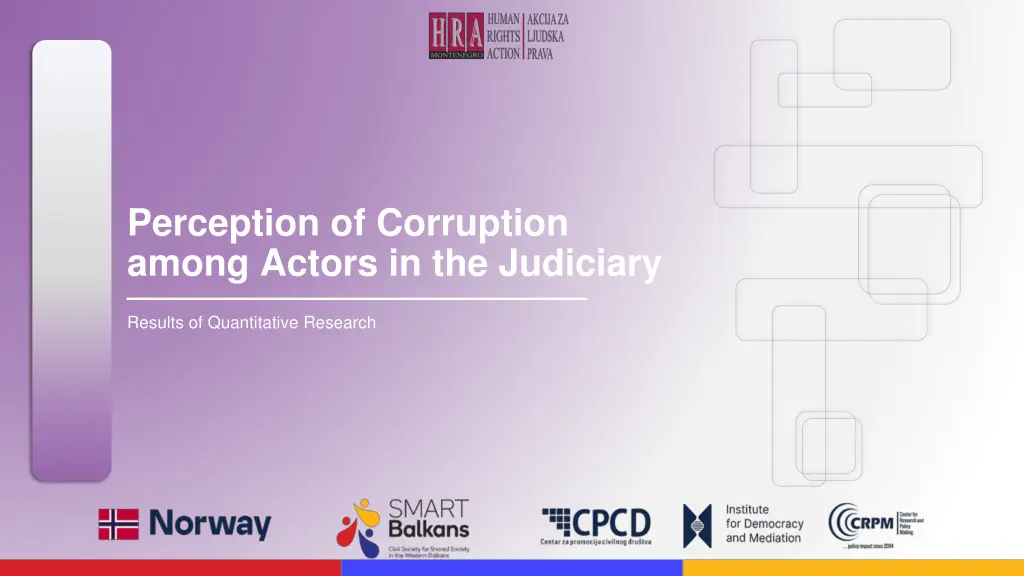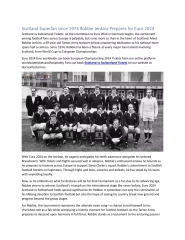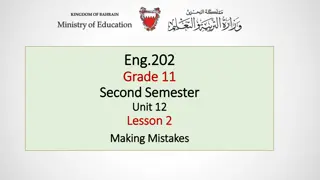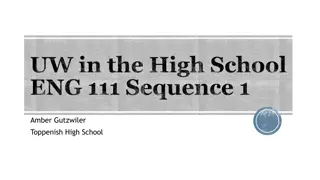
Understanding Corruption Perception in the Judiciary Through Quantitative Research
Explore the perception of corruption among key actors in the judiciary based on quantitative research findings. Discover insights on the level of corruption, presence of improper pressure, and acceptance of bribes in decision-making processes. Gain valuable knowledge on the realities within the judicial system.
Download Presentation

Please find below an Image/Link to download the presentation.
The content on the website is provided AS IS for your information and personal use only. It may not be sold, licensed, or shared on other websites without obtaining consent from the author. If you encounter any issues during the download, it is possible that the publisher has removed the file from their server.
You are allowed to download the files provided on this website for personal or commercial use, subject to the condition that they are used lawfully. All files are the property of their respective owners.
The content on the website is provided AS IS for your information and personal use only. It may not be sold, licensed, or shared on other websites without obtaining consent from the author.
E N D
Presentation Transcript
Perception of Corruption among Actors in the Judiciary Results of Quantitative Research
Method o Quantitative Research o The sample included four groups of respondents: State Prosecutors: 41 (40.1%); Court Experts: 92 (43.8%); Judges: 95 (34.7%), Attorneys: 109 (6.8%). Data collection period: July 12 September 18, 2024 Method: CAWI (Computer-Assisted Web Interviewing) *For ease of reading, all masculine terms in this presentation refer to individuals of all genders. This language has been used solely for simplicity, with no intent to exclude any gender.
Perception of the Risk of Corruption Overview of Results Among Groups
Perception of the Level of Corruption in the Judiciary* 34.7% 31.7% 31.6% 31.2% 29.3% 28.3% 24.8% 23.9% 22.8% 22.0% 20.0% 19.6% 15.2% 14.6% 12.8% 11.6% 8.7% 5.5% 5.4% 2.4% 2.1% 1.8% 0.0% 0.0% State prosecutors Judges Attorneys Court Experts 5 - It is completely present 4 3 2 1 - It is not present at all I don't know/ I don't have an opinion * What is your perception of the level of corruption in the judiciary? Please rate it on a scale from 1 to 5, where 1 means there is none at all, and 5 means it is ubiquitous.
Perception of the Presence of Corruption in the Judiciary in the Past Three Years* It was It was present present It was It was not not 25,8% 24,4% Public Prosecutors 25.8% 14.6% 9.8% 49.8% 29,5% 24,2% Judges 5.3% 24.2% 16.8% 7.4% 46.3% 69,7% 4,6% 1.8% Attorneys 23.9% 45.9% 25.7% 2.8% 35,8% 6,5% Court Experts 13.0% 22.8% 6.5% 57.6% Significant corruption Some corruption Mostly no corruption No corruption at all Don't know/Cannot assess *Do you believe there has been corruption in the judiciary system over the past three years, in your opinion?
Existence of Improper Pressure to Decide or Act in a Case* During the last three years (2021, 2022, 2023, and up to now), I have been under improper pressure to decide or act in a certain way in a case or part of a case. 82.9% 80.0% 73.9% 63.3% 19.3% 13.7% 12.2% 9.8% 8.7% 7.6% 6.4% 5.5% 5.5% 4.2% 2.4% 2.4% 1.1% 1.1% 0.0% 0.0% Public Prosecutors Judges Attorneys Court Experts Strongly agree Somewhat agree Somewhat disagree Strongly disagree Don't know/Cannot assess *To what extent do you agree with the following statements?
Some judges accept bribes (money or other gifts or services) as an incentive to make decisions in a certain way in a case. Agrees: Agrees: Disagrees: Disagrees: 7,3% 7,3% 48,8% 48,8% Public Prosecutors 7.3% 48.8% 43.9% 9,5% 9,5% 34,7% 34,7% Judges 9.5% 2.1% 32.6% 55.8% 61,5% 61,5% 6,4% 6,4% Attorneys 24.8% 36.7% 0.9% 5.5% 32.1% 17,4% 17,4% 25,0% 25,0% Court Experts 8.7% 8.7% 8.7% 16.3% 57.6% Completely agree Somewhat agree Somewhat disagree Completely disagree Don't know/Cannot assess To what extent do you agree with the following statements
Some state prosecutors accept bribes (money or other gifts or services) as an incentive to make decisions in a certain way in a case. Agrees: Agrees: Disagrees: Disagrees: 0,0 0,0% % 56,1 56,1% % Public Prosecutors 56.1% 43.9% 7,4 7,4% % 27,4 27,4% % Judges 7.4% 3.2% 24.2% 65.3% 47,7% 47,7% 34,0% 34,0% Attorneys 22.9% 24.8% 9.2% 4.6% 38.5% 14,1% 14,1% 13,0% 13,0% Court Experts 7.6% 6.5% 6.5% 15.2% 64.1% Completely agree Somewhat agree Somewhat disagree Completely disagree Don't know/Cannot assess To what extent do you agree with the following statements
Some court experts accept bribes (money or other gifts or services) as an incentive to prepare their findings in a certain way. Agrees: Agrees: Disagrees: Disagrees: Public Prosecutors 14.6% 2.4% 24.4% 58.5% 14,6% 14,6% 26,8% 26,8% 3.2% Judges 11.6% 3.2% 17.9% 64.2% 14,8% 14,8% 21,1% 21,1% Attorneys 27.5% 33.9% 8.3% 2.8% 27.5% 61,4 61,4% % 11,1 11,1% % 16,3% 16,3% 31,5% 31,5% Court Experts 4.3% 12.0% 8.7% 22.8% 52.2% Completely agree Somewhat agree Somewhat disagree Completely disagree Don't know/Cannot assess To what extent do you agree with the following statements
Some lawyers bribe certain judges and state prosecutors. Agrees: Agrees: Disagrees: Disagrees: Public Prosecutors 4,9% 4,9% 31,7% 31,7% 4.9% 2.4% 29.3% 63.4% 9,5% 9,5% 35,8% 35,8% Judges 9.5% 5.3% 30.5% 54.7% 36,7% 36,7% 18,4% 18,4% Lawyers 13.8% 22.9% 9.2% 9.2% 45.0% 15,2% 15,2% 23,9% 23,9% Court Experts 7.6% 7.6% 9.8% 14.1% 60.9% Completely agree Somewhat agree Somewhat disagree Completely disagree Don't know/Cannot assess To what extent do you agree with the following statements
Some cases are assigned to judges outside of random allocation to influence the outcome of a specific case. Disagrees: Disagrees: Agrees: Agrees: 2.4% 7,3% 7,3% 36,6% 36,6% 4.9% 4.9% Public Prosecutors 31.7% 56.1% 11,6% 11,6% 50,5% 50,5% Judges 11.6% 10.5% 40.0% 37.9% 65,1% 65,1% 7,4% 7,4% Attorneys 39.4% 25.7% 3.7% 3.7% 27.5% 31,5% 31,5% 15,2% 15,2% Court Experts 13.0% 18.5% 7.6% 7.6% 53.3% Completely agree Somewhat agree Somewhat disagree Completely disagree Don't know/Cannot assess To what extent do you agree with the following statements
Perception of the Presence of Corruption Overview of Results Among Groups
Does the existing procedure for resolving housing issues in the judiciary leave room for suspicion of corruption? Yes: 36,6% 36,6% 17.1% 19.5% No: 29,3% 29,3% Public Prosecutors 17.1% 12.2% 34.1% Yes: 39% 39% 17.9% 21.1% No: 34,7% 34,7% Judges 18.9% 15.8% 26.3% Completely agree Somewhat agree Somewhat disagree Completely disagree Don't know/Cannot judge
Do you see a risk of corruption in the promotion system within the judicial/prosecutorial profession in Montenegro? 2.4% Yes: 43,9% 43,9% 41.5% Public Prosecutors 24.4% No: 34,2% 34,2% 9.8% 22.0% Yes: 48,5% 48,5% 7.4% 41.1% Judges 23.2% No: 33,7% 33,7% 10.5% 17.9% I see a high risk I somewhat see a risk I mostly do not see a risk I do not see a risk at all Don't know/Cannot judge
Do you see a risk of conflict of interest in the membership of lawyers in the Judicial Council? Yes Yes: : No: No: 68,3% 68,3% 12,2% 12,2% Public Prosecutors 39.0% 29.3% 4.9% 7.3% 19.5% 73,6 73,6% % 18,9 18,9% % Judges 34.7% 38.9% 14.7% 4.2% 7.4% 62,4% 62,4% 33,0% 33,0% Attorneys 25.7% 36.7% 12.8% 20.2% 4.6% 41,3% 41,3% 20,7% 20,7% Court Experts 12.0% 29.3% 12.0% 8.7% 38.0% I see a high risk I somewhat see a risk I mostly do not see a risk I do not see a risk at all
Do you see a risk of conflict of interest in the membership of lawyers in the Prosecutorial Council? No: No: Yes Yes: : 73,1% 73,1% 26,8% 26,8% Public Prosecutors 39.0% 34.1% 12.2% 14.6% 73, 73,6 6% % 17,9 17,9% % Judges 36.8% 36.8% 11.6% 6.3% 8.4% 64,2% 64,2% 32,1% 32,1% Attorneys 27.5% 36.7% 11.0% 21.1% 3.7% 43,4% 43,4% 19,6% 19,6% Court Experts 14.1% 29.3% 10.9% 8.7% 37.0% I see a high risk I somewhat see a risk I mostly do not see a risk I do not see a risk at all Don't know/Cannot judge
Are you aware of any case where the lifestyle of a certain judge, state prosecutor, or lawyer significantly deviates from their officially reported income? Public Prosecutors 14.6% 19.5% 65.9% Judges 22.1% 22.1% 55.8% Attorneys 56.9% 11.0% 32.1% Court Experts 37.0% 30.4% 32.6% Yes No Don't know/Cannot judge
Do you know if a specific judge or state prosecutor has knowingly concealed information about their assets and income? Public Prosecutors 2.4% 34.1% 63.4% Judges 7.4% 27.4% 65.3% Attorneys 24.8% 26.6% 48.6% Court Experts 16.3% 37.0% 46.7% Yes No Don't know/Cannot judge
Are you aware of any case where a certain lawyer does not pay income taxes to the state? Public Prosecutors 14.6% 26.8% 58.5% Judges 23.2% 76.8% Attorneys 41.3% 48.6% 10.1% Court Experts 19.6% 17.4% 63.0% Yes No Don't know/Cannot judge
Some state prosecutors submit indictments following the schedule of the duty investigating judge, thereby bypassing the random case allocation system. Does not agree Agree: 2.4% 10,6% 10,6% 26,3% 26,3% Public Prosecutors 4.9% 4.9% 58.5% 29.3% 3.2% 7,3% 7,3% 63,4% 63,4% Judges 7.4% 8.4% 17.9% 63.2% 37,6% 37,6% 11,9% 11,9% Attorneys 18.3% 19.3% 5.5% 6.4% 50.5% Court Experts 6.5% 13.0% 9.8% 5.4% 65.2% 19,5% 19,5% 15,2% 15,2% Completely agree Somewhat agree Somewhat disagree Completely disagree Don't know/Cannot judge To what extent do you agree with the following statements.
Perception of Proposed Solutions Overview of Results Among Groups
Do you feel that you are adequately paid for the work you do? N No o: : Yes: Yes: 56,1% 56,1% 41,5% 41,5% Public Prosecutors 12.2% 43.9% 17.1% 24.4% 2.4% 5 5 18 18 7 7 10 10 1 1 3.2% Judges 18.9% 7.4% 68.4% 2.1% 22,1% 22,1% 75,8% 75,8% 3 3 18 18 7 7 67 67 2 2 Court Experts 2.2% 26.1% 28.3% 40.2% 3.3% 28,3% 28,3% 68,5% 68,5% 2 2 25 25 26 26 37 37 3 3 Yes, completely I somewhat am I mostly am not I am not at all I don't know/I cannot assess
Perceptions of Judicial Reform Agree: Does not Increasing salaries will reduce the risk of corruption. agree: 68,3% 4,9% Public Prosecutors 41.5% 26.8% 14.6% 4.9% 12.2% 61,1% 11,6% Judges 41.1% 20.0% 21.1% 5.3% 6.3% 6.3% 58,7% 16,6% Attorneys 43.1% 15.6% 21.1% 8.3% 8.3% 3.7% 51,1% 16,3% Court Experts 34.8% 16.3% 28.3% 7.6% 8.7% 4.3% 5 - Completely agree 4 3 2 1-Completely disagree I don't know/I cannot assess Please rate the following statements regarding potential reforms from 1 to 5, where 1 means "Strongly Disagree" and 5 means "Strongly Agree."
Is the current administrative and professional support sufficient to maintain the quality and timeliness of work? Yes: Yes: No: No: 39,0% 39,0% 53,6% 53,6% Public Prosecutors 4.9% 34.1% 34.1% 19.5% 7.3% 25,3% 25,3% 42,1% 42,1% Judges 25.3% 30.5% 11.6% 32.6% Attorneys 5.5% 23.9% 43.1% 23.9% 3.7% 29,4% 29,4% 67,0% 67,0% Court Experts 7.6% 27.2% 35.9% 7.6% 21.7% 34,8% 34,8% 43,5% 43,5% Yes, completely Partially yes Mostly no Not at all I don't know/I cannot assess
Perceptions of Judicial Reform Agree: Does not Audio-visual recording of hearings and trials will reduce complaints about the work agree: 41,5% 29,3% Public Prosecutors 17.1% 24.4% 29.3% 22.0% 7.3% 45,3% 21,1% Judges 22.1% 23.2% 28.4% 7.4% 13.7% 5.3% 0.8% 79,8% 5,6% 2.8% Attorneys 53.2% 26.6% 13.8% 2.8% 2.2% 74,0% 10,8% Court Experts 37.0% 37.0% 13.0% 4.3% 6.5% 5 - Completely agree 4 3 2 1-Completely disagree I don't know/I cannot assess Please rate the following statements regarding potential reforms from 1 to 5, where 1 means "Strongly Disagree" and 5 means "Strongly Agree."
Perceptions of Judicial Reform Agree: Does not Digitalization of the judiciary will reduce the risk of corruption. agree: 22,0% 14,7% Public Prosecutors 12.2% 9.8% 46.3% 9.8% 4.9% 17.1% Judges 7.4% 24.2% 33.7% 7.4% 13.7% 13.7% 31,6% 21,1% 5.5% Attorneys 35.8% 23.9% 25.7% 66,1% 11,1% 5.5% 3.7% Court Experts 32.6% 26.1% 22.8% 7.6% 4.3% 6.5% 58,7% 11,9% 5 - Completely agree 4 3 2 1-Completely disagree I don't know/I cannot assess Please rate the following statements regarding potential reforms from 1 to 5, where 1 means "Strongly Disagree" and 5 means "Strongly Agree."
Would the documentation of exceptions for judges and prosecutors, along with the transparency of these procedures, contribute to reducing the risk of corruption? Does not Does not agree: agree: Agree: Agree: 34,2 34,2% % 34,2 34,2% % Public Prosecutors 9.8% 24.4% 17.1% 17.1% 31.7% 47,4 47,4% % 33,7 33,7% % Judges 5.3% 42.1% 23.2% 10.5% 18.9% 67,0% 67,0% 23,8% 23,8% Attorneys 31.2% 35.8% 16.5% 7.3% 9.2% Court Experts 19.6% 35.9% 7.6% 4.3% 32.6% 55,5% 55,5% 11,9% 11,9% Definitely would Somewhat would Mostly would not Definitely would not Don't know
Perceptions of Judicial Reform Agree: Does not Vetting would reduce the risk of corruption. agree: 19,6% 31,7% Public Prosecutors 9.8% 9.8% 29.3% 4.9% 26.8% 19.5% 28,4% 36,9% Judges 17.9% 10.5% 24.2% 9.5% 27.4% 10.5% 59,7% 11,0% Attorneys 36.7% 29.4% 16.5% 2.8% 8.3% 6.4% 52,2% 8,6% 4.3% Court Experts 26.1% 26.1% 22.8% 4.3% 16.3% Strongly agree Agree Neutral Disagree Strongly disagree Don t know/No opinion Please rate the following statements regarding potential reforms from 1 to 5, where 1 means "Strongly Disagree" and 5 means "Strongly Agree."
Agreement with the Introduction of Phased Vetting* Does not agree: Agree: Public Prosecutors 7.3% 17.1% 9.8% 31.7% 34.1% 41,5% 24,4% 36,8% 42,1% Judges 22.1% 20.0% 2.1% 34.7% 21.1% 18,4% 72,5% Attorneys 45.9% 26.6% 9.2% 9.2% 9.2% 7,6% 66,3% Court Experts 41.3% 25.0% 5.4% 2.2% 26.1% Strongly agree Somewhat agree Somewhat disagree Strongly disagree Don t know/Cannot estimate *Do you agree with the proposal to introduce phased vetting by a credible commission?
Procedures in the case of introducing phased vetting* 78.0% State Prosecutors 7.3% 14.6% I will accept being part of the vetting process I will resign because I don't trust the vetting the process is humiliating and unfair Don't know/Cannot assess 71.6% Judges 3.2% 25.3% *If vetting were to be introduced, how would you proceed:
The impact of integrity criteria on reducing corruption among state prosecutors: Yes: 75,6% 75,6% 19.5% 56.1% No: 17,9% 17,9% State Prosecutors 12.2% 4.9% 7.3% 22.1% Yes: 58,9% 58,9% 36.8% Judges 16.8% No: 22,1% 22,1% 5.3% 18.9% Definitely would Probably would Probably would not Definitely would not Don't know/No opinion In your opinion, could the introduction of the "integrity" criteria (worthy/unworthy) contribute to preventing corruption?
The impact of integrity criteria on reducing corruption among judges: 19.5% Yes: 75,6% 75,6% 56.1% State Prosecutors 14.6% No: 19,5% 19,5% 4.9% 4.9% Yes: 63,1% 63,1% 24.2% 38.9% No: 24,2% 24,2% Judges 20.0% 4.2% 12.6% Definitely would Probably would Probably would not Definitely would not Don't know/No opinion In your opinion, could the introduction of the "integrity" criteria (worthy/unworthy) contribute to preventing corruption?
Do you agree with the Ministry of Justice's initiative to introduce a Special Court? Does not Does not agree: agree: Agree: Agree: 82,9% 82,9% 7,3% 7,3% Public Prosecutors 51.2% 31.7% 7.3% 9.8% 75,8% 75,8% 12,6% 12,6% Judges 40.0% 35.8% 6.3% 6.3% 11.6% 71,5% 71,5% 22,0% 22,0% Attorneys 48.6% 22.9% 11.9% 10.1% 6.4% Court Experts 46.7% 22.8% 4.3% 23.9% 69,5% 69,5% 6,5% 6,5% 2.2% Strongly agree Somewhat agree Mostly disagree Completely disagree Don't know
Perception of Expertise in the Judiciary Overview of Results Among Groups
State Prosecutors: How would you rate the level of expertise on a scale from 1 to 5, where 1 represents "very poor" and 5 represents "excellent": Low level of expertise High level of expertise 73,2% 73,2% 0,0% 0,0% Public Prosecutors 31.7% 41.5% 24.4% 2.4% 53,7% 53,7% 2,4% 2,4% Judges 17.1% 36.6% 41.5% 2.4% 2.4% 19,5% 19,5% 21,9% 21,9% Attorneys 7.3% 12.2% 53.7% 19.5% 2.4% 4.9% Court Experts 17.1% 31.7% 29.3% 14.6% 7.3% 48,8 48,8% % 14,6 14,6% % 5-High level of expertise 4 3 2 1-Low level of expertise Don't know/Cannot judge N=41
Judges: How would you rate the level of expertise on a scale from 1 to 5, where 1 represents "very poor" and 5 represents "excellent": High level of expertise Low level of expertise 37,9% 37,9% 17,9% 17,9% Public Prosecutors 7.4% 30.5% 28.4% 15.8% 2.1% 15.8% 2.1% 63,2% 63,2% 2,1% 2,1% Judges 13.7% 49.5% 28.4% 6.3% 1.1% 19,0% 19,0% 21,1% 21,1% Attorneys 17.9% 54.7% 20.0% 5.3% 1% 47,4% 47,4% 7,4% 7,4% Court Experts 5.3% 42.1% 42.1% 7.4% 3.2% 5-High level of expertise 4 3 2 1-Low level of expertise Don't know/Cannot judge N=95
Attorneys: How would you rate the level of expertise on a scale from 1 to 5, where 1 represents "very poor" and 5 represents "excellent": Low level of expertise High level of expertise 18,4% 18,4% 34,0% 34,0% 1.8% Public Prosecutors 2.8% 15.6% 45.0% 30.3% 3.7% 26,6% 26,6% 2 21,8 1,8% % 0.9% Judges 2.8% 24.8% 50.5% 18.3% 2.8% 3.7% 26,6% 26,6% 19,3% 19,3% Attorneys 4.6% 22.0% 50.5% 16.5% 2.8% 3.7% 26,6% 26,6% 25,7% 25,7% Court Experts 1.8% 24.8% 44.0% 21.1% 4.6% 5-High level of expertise 4 3 2 1-Low level of expertise Don't know/Cannot judge N=109
Court Experts: How would you rate the level of expertise on a scale from 1 to 5, where 1 represents "very poor" and 5 represents "excellent": Low level of expertise High level of expertise 30,4% 30,4% 14,2% 14,2% Public Prosecutors 7.6% 22.8% 38.0% 10.9% 3.3% 17.4% 39,2% 39,2% 10,8% 10,8% Judges 10.9% 28.3% 38.0% 6.5% 4.3% 12.0% 31,5% 31,5% 21,7% 21,7% Attorneys 5.4% 26.1% 39.1% 16.3% 5.4% 7.6% 1.1% Court Experts 12.0% 38.0% 28.0% 50,0% 50,0% 5,4% 5,4% 6.5% 4.3% 5-High level of expertise 4 3 2 1-Low level of expertise Don't know/Cannot judge N=92
Main Findings The research covered several topics, mainly: assessment of working conditions, perception of corruption and experiences with corruption and undue pressure, as well as attitudes towards the introduction of vetting. SATISFACTION SATISFACTION WITH WITH WORKING WORKING CONDITIONS CONDITIONS State prosecutors are the most satisfied with their working conditions more than half (56.1%) of respondents believe they are adequately compensated for the work they do. Experts are less satisfied (28.3%), while judges are the least satisfied, with less than a quarter (22.1%) expressing satisfaction with their salary. An overwhelming majority of surveyed state prosecutors (85.3%) and judges (76.8%) agree that raising salary levels ensures the independence and impartiality of their work. Prosecutors are the most satisfied with administrative and professional support in their work (39%), while judges are the least satisfied (25.3%). PERCEPTION PERCEPTION OF OF CORRUPTION CORRUPTION IN IN THE THE JUDICIARY JUDICIARY As As many many as prosecutors prosecutors ( (31 be more prevalent than state prosecutors and judges. Nearly half of prosecutors (46.3%) and judges (46%) think that corruption does not exist or is almost non-existent, while only 7.3% of lawyers and 14% of court experts share this view. Perspectives also differ regarding the most effective way to reduce the risk of corruption. Judges and state prosecutors believe that raising salaries is the most important factor, while lawyers and experts emphasize the introduction of audio- visual recording of hearings and trials. Almost every other interviewed judge (48.5%) and nearly as many state prosecutors (43.9%) see a risk of corruption in the system of career advancement within the judiciary and prosecutorial professions in Montenegro. as 80 80% % of of surveyed surveyed lawyers, 31. .7 7% %) ) believe believe that lawyers, 63 that corruption corruption exists 63. .1 1% % of of court exists in in Montenegro's court experts, experts, a a third Montenegro's judiciary third of of surveyed surveyed judges judiciary. Lawyers and experts perceive corruption to judges ( (33 33. .7 7% %), ), and and slightly slightly fewer fewer state state
IMPROPER IMPROPER PRESSURE PRESSURE AND AND BRIBERY BRIBERY When asked whether they had been subjected to inappropriate pressure to decide or act in a certain way in a specific case over the past three years, 2.4% of surveyed state prosecutors and 5.3% of judges answered affirmatively. The same was reported by 11.9% of lawyers and 8.7% of court experts. . The The belief belief that majority of surveyed lawyers 61.5%. This view is also supported by 17.4% of court experts, 7.3% of state prosecutors, and 7.3% of judges themselves. that some some judges judges accept accept bribes bribes as an incentive to act in a certain way in specific cases is shared by the Nearly half of the surveyed lawyers (47.7%) believe that certain shared by 14.1% of court experts and 7.4% of judges. None of the interviewed prosecutors agreed with this statement. certain state state prosecutors prosecutors accept accept bribes bribes. This view is That That certain certain court prosecutors. This statement is also agreed upon by 16.3% of court experts themselves. court experts experts accept accept bribes bribes is a belief held by 61.4% of lawyers, 14.8% of judges, and 14.6% of state The The belief belief that 9.5% of judges, and 4.9% of state prosecutors, as well as more than a third of the interviewed lawyers 36.7%. that certain certain lawyers lawyers give give bribes bribes to to some some judges judges and and state state prosecutors prosecutors is held by 15.2% of court experts,
INTRODUCTION INTRODUCTION OF OF VETTING VETTING Lawyers are the most supportive of introducing a phased vetting process. 72.5% of lawyers and 66.3% of court experts agree with this idea. On the other hand, less than half of judges (42.1%) and less than a quarter of state prosecutors (24.4%) support it. However, although state prosecutors are the least supportive of the introduction of vetting, they are the most willing to undergo it, with 78% expressing readiness. Similarly, 71.6% of judges are also prepared to undergo vetting, indicating a high level of willingness among judicial office holders to contribute to reducing corruption and the perception of corruption in the judiciary. The remaining judges and state prosecutors generally have no opinion on the topic, while only 7.3% of state prosecutors and 3.2% of judges stated that they would resign if vetting were introduced.






















